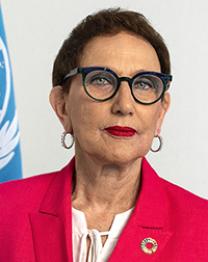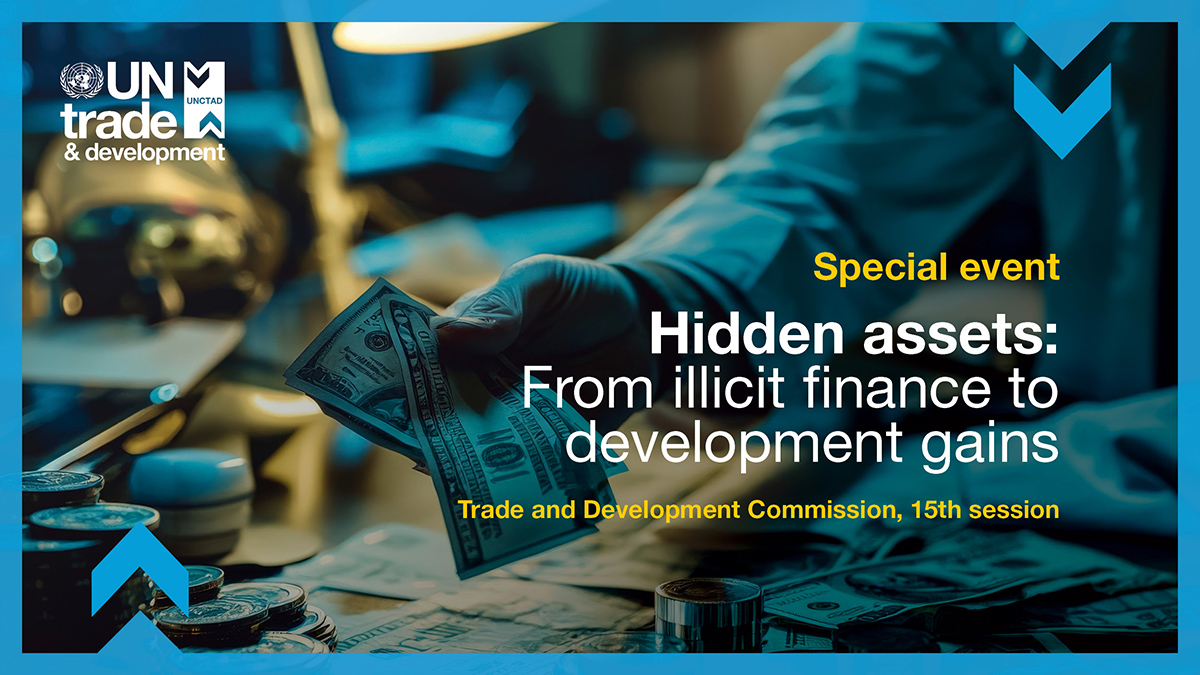
Illicit Financial Flows (IFFs) drain resources from development, fueling money laundering, corruption, and economic instability. These - often hidden- financial movements imperil domestic resource mobilization, undermine the rule of law, and are difficult to track and measure. UNCTAD works closely with leading global experts through the Task Force on the Statistical Measurement of IFFs. Recent academic research highlights that IFFs are not only tied to illegal activities but can be embedded in regular economic transactions, including tax avoidance and profit shifting. These practices deepen asymmetries in international finance, erode domestic revenue bases in developing countries, and hinder progress towards sustainable development by diverting critical resources needed for economic and social advancement.
UNCTAD and UN SDG Action Campaign are co-hosting this session to bring together leading academics as well as experts from UN SDG Action Campaign and UNCTAD to discuss the impact of IFFs on economic development and policies to combat IFFs. The seminar will feature three thematic discussions about the role of the asset management sector in the global network of illicit finance, the function of specific enablers in this system and regulatory tools and policies available to developing countries seeking to combat IFFs and secure long-term finance for development.
This special event will be held during the 15th session of the Trade and Development Commission. The views presented by the invited speakers do not necessarily reflect the official position of UNCTAD and UN SDG.
Programme
Opening remarks
- Ms. Rebeca Grynspan, Secretary-General of UNCTAD (TBC)
- Ms. Luz Ma De La Mora, Director, Division on International Trade and Commodities, UNCTAD
- Ms. Marina Ponti, Global Director, United Nations SDG Action Campaign
- Ms. Anastasia Nesvetailova, Head, Macroeconomic and Development Policies Branch, UNCTAD (Chair)
Session 1: New Risks of Financialization: Perspectives from developing regions
- Chenai Mukumba, Executive Director of the Tax Justice Network Africa.
- The Political Economy of Africa’s links with Asian International Financial Centres
by Ricardo Soares de Oliveira, CERI Sciences Po. - Spiderweb Capitalism: Secret Financial Webs Built by the Ultra-Wealthy
by Kimberly Kay Hoang, University of Chicago - How professional service firms shape development and access to FDIs in Africa and Latin America
by Corentin Cohen, University of Oxford
Session 2: Illicit Financial Flows: State of Play and Policy Directions
- Net Income Resource Transfer
by Penelope Hawkins, Head, Debt and Development Finance Branch, UNCTAD - Ranking the Illicit World: How International Rankings Can Better Support Global Governance Efforts
by Alexander Cooley, Columbia University - Offshore Experts and State Capture
by Brooke Harrington, Dartmouth College - Identifying and prosecuting 'kleptocratic enterprises': challenges and opportunities
by John Heathershaw, University of Exeter
Session 3: Asset Management and Economic Development
- Tracking IIFs: a statistician’s perspective
by Anu Peltola, Director, UNCTAD Statistics Office - Engaging the Private Sector in the Recovery of Corrupt Assets
by Jason Sharman, University of Cambridge - Who Hides? Identifying Patterns in the Ownership of Expensive Property through Offshore Financial Centers
by Kristin Surak, London School of Economics - New Regulatory Tools in Corporate Arbitrage: Implications for Developing Countries
by Jean-Philippe Robé, Sciences Po Law School
Participation
The Commission is open to all member States of UNCTAD. Specialized agencies, intergovernmental bodies and non-governmental organizations (general and special category) are also eligible to participate as observers.
Registration
Online registration is mandatory for all those wishing to attend the session and is required in order to be included in the list of participants.
In September 2021, Rebeca Grynspan was appointed Secretary-General of the United Nations Conference on Trade and Development (UNCTAD), becoming the first woman to lead the organization in its 60-year history.
Rebeca Grynspan, an economist and former Vice President of Costa Rica, is an experienced leader of international institutions with a substantive track record in government, UN diplomacy, economic policy and multilateral cooperation at the global level.
Prior to joining the United Nations, she was Vice President of Costa Rica and held cabinet positions as Minister of Housing, Minister Coordinator of Economic and Social Affairs and Deputy Finance Minister.
Previously, she served as Secretary-General of the Ibero-American Conference (2014–2021), chairing regional summits of Heads of State and Government; United Nations Under-Secretary-General and Associate Administrator of the United Nations Development Programme (UNDP); and UNDP Regional Director for Latin America and the Caribbean. She was a member of the UN Commission for the Reconstruction of Haiti, representing the UN Secretary-General.
At UNCTAD, Grynspan has been at the centre of critical negotiations to address global trade and development challenges. She played a decisive role in the successful Black Sea Grain Initiative brokered between the UN, Türkiye, the Russian Federation and Ukraine, which enabled the safe export of over 32 million tons of grain, lowered global food prices by 22% and prevented millions from falling into food insecurity. She also leads the UN Global Crisis Response Group on food, energy and finance, and has represented the UN in G20 summits.
Her leadership has been recognized widely. In 2024, she received the Doha Negotiator of the Year Award for spearheading UN efforts to restore Black Sea trade routes. In 2025, Spain’s Ministry of Foreign Affairs, European Union and Cooperation awarded her the inaugural Isabel Oyarzábal Women in Multilateralism International Prize for her contribution to multilateralism.
Ms. Grynspan holds degrees in economics from the University of Costa Rica and the University of Sussex, and honorary doctorates from several European universities.
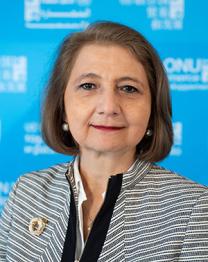
Luz Maria de la Mora is the Director of UNCTAD's Division on International Trade and Commodities. As a former Vice-Minister for International Trade and decades of government and private sector positions, Ms. de la Mora developed a career in international trade policy, negotiation, operations, and trade promotion.
During her tenure as Vice-Minister for International Trade of Mexico from 2018 to 2022, Ms. de la Mora led Mexico's trade and investment policy, overseeing fourteen free trade agreements with 51 countries. To bolster Mexico's development, she steered discussions in the World Trade Organization, the United States-Mexico-Canada Trade Agreement, Comprehensive and Progressive Agreement for Trans-Pacific Partnership, and Pacific Alliance, among others. She also coordinated policy dialogues and handled private sector consultations.
Ms. de la Mora holds a PhD in Political Science from Yale University, USA, a Master's degree in International Affairs from Carleton University, Canada, and a Bachelor's degree in International Relations from El Colegio de México, Mexico.
She is fluent in English and Spanish, and proficient in French.
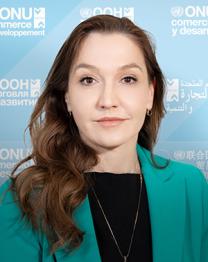
Anastasia Nesvetailova (BSc Econ; MSc IPE; PhD IPE) is the Head of the Macroeconomic and Development Policies Branch of UN Trade and Development (UNCTAD) in Geneva. She leads the team responsible for the flagship Trade and Development Report.
Before joining UNCTAD Anastasia has been a Professor of International Political Economy at City, University of London, and held visiting fellowships at the University of California, the Levy Institute of Bard College, the Danish Institute of International Studies and CERIS-ULB School in Brussels.
Anastasia’s main research has focused on the political economy of finance. She has published widely on issues of financial instability, financial innovation and governance, including three monographs (Fragile Finance: Debt, Speculation and Crisis in the Age of Global Credit , 2007; Financial Alchemy in Crisis: The End of Liquidity Illusion, 2010; and Sabotage: The Business of Finance, 2020, with R. Palan), as well as numerous academic and policy articles on the global financial system.
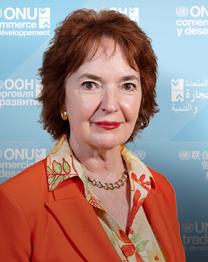
Penelope Hawkins is the Officer-in-Charge of the Debt and Development Finance Branch within UN Trade and Development (UNCTAD), a branch that includes the Debt and Development Finance Research Unit as well as the Debt Management and Financial Analysis System (DMFAS) Programme, which currently facilitates the debt recording and management in over 60 developing countries.
In her current position, Ms. Hawkins researches and engages with member country representatives and the broader civil and academic society on sustainable sovereign debt, financing for development, and the nexus between debt and climate finance. She represents UNCTAD at the G20 International Financial Architecture Working Group meetings and is the G20 Finance Deputy to UNCTAD Secretary-General Rebeca Grynspan. She also represents UNCTAD in several fora, including most recently at the Fourth International Finance for Development Conference (FFD4), G24 meetings in Washington DC and BRICS meetings.
Previously, as the founder and Managing Director of Feasibility (Pty) Ltd, Ms. Hawkins undertook leading research projects in the financial sector in Southern Africa, commissioned by regulators, policy makers and the private sector.
Her expertise in the financial sector stems from her published work. She holds a PhD in economics from the University of Stirling, Scotland, and an M.A. in economics (cum laude) from the University of South Africa.
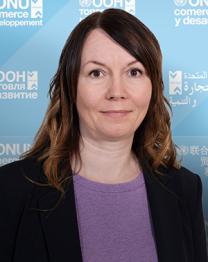
Anu Peltola is the Director of UNCTAD Statistics, Data and Digital Service overseeing the statistical, digital transformation and information technology work of the UN Trade and Development. She supports countries in measuring Sustainable Development Goals (SDG) indicators on trade, maritime transport, investment, illicit finance, South-South cooperation, and enterprise sustainability. Anu brings over 25 years of experience in official statistics at both the national and international levels.
She serves as the UNCTAD Chief Statistician coordinating internal, UN system-wide and international statistical and data efforts, including initiatives such as beyond GDP and the cost of SDG transitions. She is the co-chair of the UN system Chief Statisticians (CCS-UN) and the Committee for the Coordination of international Statistical Activities (CCSA) consisting of 45 international organizations. Her team also contributes to the development of new statistics and methodologies and supports UNCTAD programs in creating and delivering innovative, AI-assisted data management platforms for diverse domains such as non-tariff measures, informal cross-border trade, international investment policies, laws and regulations. It helps enhance countries' statistical capacity in measuring trade and development, for instance through the Trade-in-Services Statistics information system (TiSSTAT), a modern tool for national statistical authorities, as well as through a new set of indicators on gender equality in trade and the inclusive growth index (IGI). UNCTAD's statistics are released in UNCTAD Data Hub and Data Insights always reflecting the latest data in UNCTADStat and SDG Pulse sharing the latest data-driven analysis.
Before joining UNCTAD, Anu was engaged in preparing Chief Statisticians’ meetings under the Conference of European Statisticians in UNECE and coordinated international efforts to develop guidance for instance on modernising statistical legislation and enhancing the value of official statistics. She established a new joint work stream for climate and statistical communities. Previously, she worked in Statistics Finland serving as Head of Statistics and Head of Development in short-term economic, business and household statistics.



